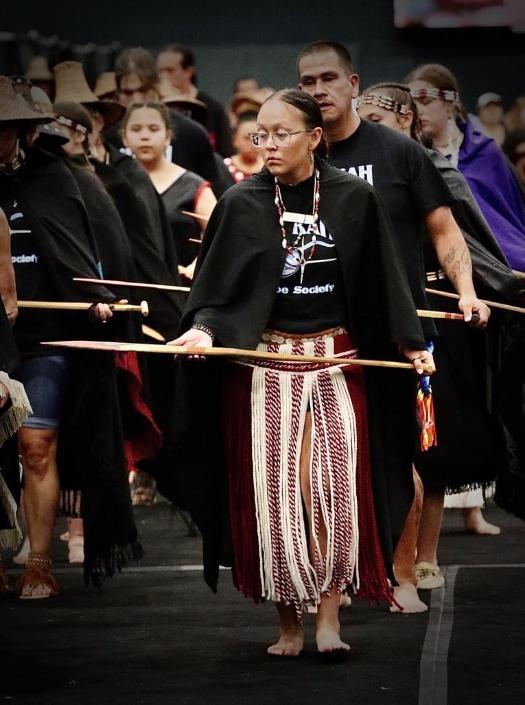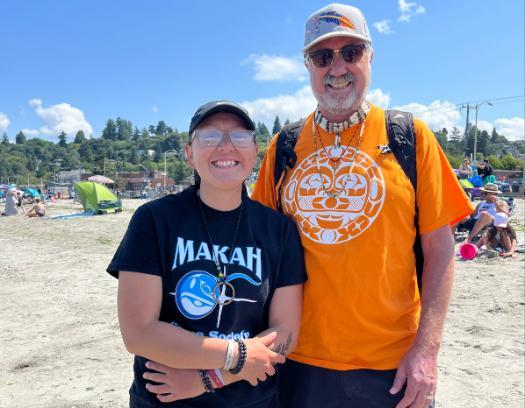Navigating to Preserve Ancient Tradition
Written by Andrew Binion
Thursday, September 14, 2023
/32x0:1099x681/prod01/channel_34/media/newsroom/Canoe-with-Branndi-pic-1-1130X681.jpg)
Nursing student and track athlete Branndi Bowechop, ’26, a member of the Makah Tribe, grew up paddling with her tribe’s canoe family. This year she took over as skipper.
Branndi Bowechop, ‘26, can recall sitting in the skipper seat at the stern of the Makah Tribe’s canoe at age 3 or 4, running her hands on the gunwale rails.
Though barely old enough to wield a paddle on her own, she had a premonition.
“This is going to be my canoe someday,” she said to her mom and grandma.
In July, as part of the 2023 tribal Paddle to Muckleshoot, the Seattle University nursing major and track athlete fulfilled that promise, leading her canoe family as they joined with other tribal canoe families on the roughly week-long journey to Alki Beach in West Seattle.
“It’s something I grew up doing, it’s something I’ve been around since I could remember,” Bowechop says. “It’s something that brings me joy and happiness because I get to see and meet all these friends and family who I usually only see on canoe journeys.”
The canoe journeys also connect Bowechop to traditions and practices that reach back thousands of years.
Though Indigenous peoples of the Pacific Northwest coast have been using canoes for travel, hunting and ceremonies since time immemorial, modern tribal canoe journeys began in 1989 with Washington state’s centennial and took on a life of its own. The journeys have become annual events, regularly drawing tribes from Oregon, Alaska and British Columbia. Each year a different tribe hosts the gathering, which includes landing protocols and dancing and singing.
“It’s so cool that everybody is able to get together and we can all practice what we used to do—travel the waters we all used to travel before we were colonized,” Bowechop says.
The landing protocols are elaborate ceremonies where arriving canoes formally ask permission from the host tribe to come ashore.
“Everybody does theirs a little differently,” Bowechop says. “Some sing before they say anything. Some people speak in their language and then translate it. But mainly the most important thing is to say who you are and where you are coming from and to ask to come ashore and share meals, songs and dances.”

Branndi Bowechop, ’26, stands with her paddle in a ceremony for the 2023 canoe journey.
The journey is not easy. For nine days, Bowechop’s 10-person canoe family pulled themselves across the water for 20-mile stretches, which equates to about four to five hours a day.
“Depending on the water, some days weren’t as bad, some days went pretty quick and it didn’t feel like 20 miles,” she says.
Together they traveled over long areas of the Salish Sea, from the Makah Reservation at Neah Bay—the northwestern-most tip of Washington state—joining with other tribes along the coastline of the Olympic Peninsula and into the Puget Sound. They stopped at landings along the way to camp, until they were greeted by the Muckleshoot Indian Tribe and whisked to the reservation near Auburn.
Accompanied by a motorboat piloted by her uncle, Bowechop felt the tug of her duty as skipper and the weight of an ancient tradition for the people who for thousands of years relied on the sea for nourishment and spiritual sustenance.
Though she spent some time in the skipper seat in 2019, which was the last canoe journey before the larger events were postponed due to the COVID-19 pandemic, this was the first canoe journey where Bowechop mainly led the pullers.
“It does get rough,” Bowechop says of the swells and salt water. “I was using every single tiny muscle in my body to steer the canoe.”
Every journey is different and on this one Bowechop felt the paddling helped her heal. Besides training in Neah Bay, she hadn’t been out on the water in three years and earlier this year her family suffered the death of Bowechop’s great grandmother, Kate McCarty.
“That was a hard loss for me,” Bowechop says. “It was nice to be out there and just heal from it and reflect on everything.”
The paddlers were met by sea life, including a whale near Pillar Point on the Strait of Juan de Fuca and every day the crew practiced for the journey in Neah Bay a little seal would follow them around. When they shoved off for the final voyage, Bowechop noticed that without fail a seal would tail behind the canoe.
“Every morning when we would leave there would be the seal somewhere, it would be following us,” she says. “It’s not the same seal, but I like to think it was the same one.”
When Bowechop landed on Alki she was greeted by Tony Monroe, assistant coach for the Seattle University track team.

Branndie Bowechop with assistant track coach Tony Monroe.
Though Bowechop competed in track and field at Neah Bay High School, mainly javelin, she was sidelined by a shoulder injury and wasn’t recruited as an athlete. As a nursing student she didn’t think she would have time.
While sharing some fry bread last year at the SU Indigenous Peoples Institute Monroe, an enrolled member of the Confederated Tribes and Bands of the Yakama Nation (Kah milth pum and Klickitat) of Washington, convinced Bowechop to give track another try. She started training and competed in multiple meets. This year she plans to add shot put to her repertoire.
At the end of the school year Monroe had issued track athletes a workout regimen for the summer. After they greeted one another, which Monroe admits was emotional, seeing all the canoes converge on the beach, Bowechop blurted out that she hadn’t been keeping up with the workouts. Monroe burst into laughter.
“That’s OK,” Monroe said. “I don’t think you need to.”
/0x20:1130x734/prod01/channel_34/media/seattle-university/news-amp-stories/images/CAS_WinterConversations-1130X753.jpg)
/0x37:2240x1452/prod01/channel_34/media/seattle-university/news-amp-stories/magazine/fall-2025/IzzyG_newstory.jpg)
/0x42:2400x1558/prod01/channel_34/media/seattle-university/news-amp-stories/images/PNW_Living_AlkiBeach_yk_005-copy.jpg)